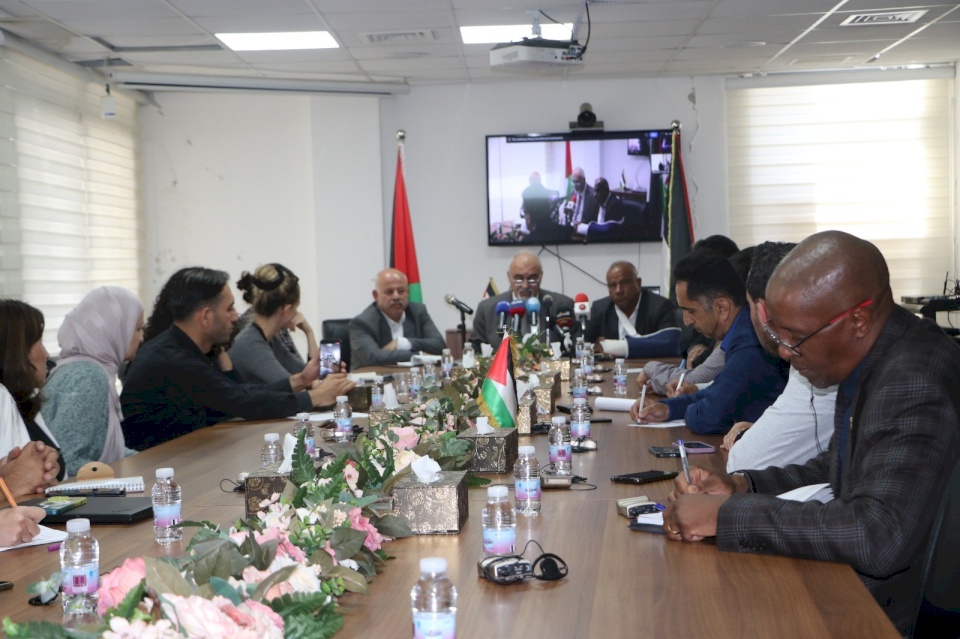
During a joint press conference at the Ministry of Agriculture: Collective confirmation on protecting the olive season, enhancing farmers' resilience, and documenting Israeli violations
SadaNews - The Palestinian Ministry of Agriculture organized a joint press conference yesterday morning, Tuesday, at its headquarters in Ramallah, in collaboration with the Wall and Settlement Resistance Authority and the Palestinian Network of Non-Governmental Organizations. The conference was dedicated to discussing the reality of the agricultural sector and the 2025 olive harvest season, as well as the repercussions of the escalating Israeli and settler assaults on land, farmers, and natural resources.
Speakers emphasized the necessity of providing international protection for Palestinian farmers and ensuring their safe access to their agricultural lands, affirming that the continuation of violations poses a direct threat to the national food security system and the rights of the Palestinian people to sovereignty over their agricultural and water resources.
Minister of Agriculture: Protecting olives is protecting national and food identity
The Minister of Agriculture, Professor Zarq Salimiah, confirmed in his opening speech that the Palestinian agricultural sector represents a fundamental pillar for food security and national sovereignty, as well as a lever for sustainable rural development and fighting poverty and unemployment, contributing approximately 8% of the gross domestic product and providing more than 60,000 direct job opportunities.
He pointed out that the Israeli occupation controls over 60% of the West Bank lands, depriving Palestinians of investing in their agricultural lands and water resources. He noted that the sector has suffered losses exceeding 70 million US dollars since the beginning of the year due to tree uprooting, destruction of agricultural infrastructure, and theft of livestock.
He explained that the olive tree, which represents more than 70% of fruit trees in Palestine, embodies the Palestinian identity rooted in the land. There have been documented reports of the uprooting of more than 15,000 olive trees since last October due to settler assaults, adversely affecting local production and the stability of food supply chains.
Salimiah also addressed the "Olive 2025" campaign that the ministry is implementing in partnership with national and international institutions, aimed at: enhancing the resilience of farmers in threatened areas; enabling them to safely access their lands through field protection and international accompaniment; documenting and monitoring agricultural violations; supporting agricultural rehabilitation programs and enhancing local production.
He revealed that the occupation forces have arrested 32 international volunteers of different European nationalities who participated in the campaign, which is a clear violation of the right to humanitarian solidarity.
Wall and Settlement Resistance Authority: Settlers are practicing organized agricultural terrorism
For his part, the head of the Wall and Settlement Resistance Authority, Muayad Shaaban, explained that what is happening in the West Bank is "organized agricultural terrorism" practiced by armed settler militias with the protection of the occupation army, in an attempt to turn the olive season from a season of goodness and giving into a season of loss and violence.
He indicated that the authority documented more than 150 assaults in less than two weeks, including the theft of crops and harvesting tools and the uprooting of about 700 olive trees, calling for activating a system of popular and international protection for farmers, holding settlers accountable for their crimes, and enhancing integrated work between official and civil institutions and village municipalities in targeted areas.
The Network of Non-Governmental Organizations: Towards a National Plan for Agricultural Recovery
In his intervention, Munjed Abu Jish, General Director of the Agricultural Development Association and member of the Network of Non-Governmental Organizations, reviewed the extensive destruction of the agricultural sector in the Gaza Strip, pointing out that more than 90% of agricultural infrastructure was destroyed, including wells, greenhouses, livestock farms, and olive presses, with more than 40,000 dunams cultivated turning into only 4,000.
Abu Jish emphasized the importance of establishing a comprehensive national plan for replanting olives and building sustainable agricultural recovery programs that integrate concepts of resilience, good agricultural governance, and efficient natural resource management, stressing that "Palestinian land must remain productive and fortified against displacement and settlement."
Message of the Conference: Towards Resistant Agriculture and National Food Sovereignty
Participants stressed that the olive season this year represents a battle of existence and resilience, and that defending the Palestinian farmer is defending food security and sovereignty over the land, affirming the necessity of supporting the Ministry of Agriculture's programs within the framework of the national agricultural recovery plan 2025–2027, and expanding the "urgent response" initiative to protect livelihoods and enhance farmers' abilities to adapt and endure.
The conference concluded with a reiteration that Palestinian agriculture will remain the first line of defense for national identity, and that the Palestinian people are capable of turning challenges into opportunities for a productive and sustainable agricultural economy that reinforces the right to land, sovereignty, and dignity.

The National Popular Conference for Jerusalem: The Occupation Invents a "New Jerusalem" in...

The Central Election Commission Discusses Local Elections 2026 with Media Institutions and...

Al-Quds House of Money Agency Implements the Second Phase of the "Warm Winter" Campaign fo...

Minister of Interior Chairs the Supreme Council for Civil Defense Meeting, Emphasizing Rea...

The Network of Civil Organizations Condemns the Submission of International Organizations...

Police Unveils Circumstances of Theft of a Large Sum of Money from a House in Tulkarem

SadaNews and JobNet… Urgent News and Job Opportunities Delivered to You via SMS

